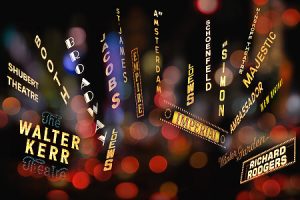
 In two of his recent columns for the New York Post, Michael Riedel editorialized a bit about the inadequate way Broadway theaters dim their lights in tribute to luminaries who have passed on. It is traditional for outdoor marquees to be dimmed for one minute just before show time; however, when veteran publicist Shirley Herz died two weeks ago, Riedel noted that some theaters didn’t dim their marquees at all, while others “blinked off for a couple of seconds.” “Is it too much to ask, Broadway League,” asked Riedel, “to make sure that all the theaters dim their lights at the same time?”
In two of his recent columns for the New York Post, Michael Riedel editorialized a bit about the inadequate way Broadway theaters dim their lights in tribute to luminaries who have passed on. It is traditional for outdoor marquees to be dimmed for one minute just before show time; however, when veteran publicist Shirley Herz died two weeks ago, Riedel noted that some theaters didn’t dim their marquees at all, while others “blinked off for a couple of seconds.” “Is it too much to ask, Broadway League,” asked Riedel, “to make sure that all the theaters dim their lights at the same time?”
His comment led to a slew of likeminded emails who bemoaned “the slippage of this fine old theatrical tradition.” Readers commented that stars like James Gandolfini and Patricia Neal simply didn’t get the minute of tribute they merited. It doesn’t sound like a big deal, but in contrast, Riedel noted how touching it was to see Vanessa Redgrave and Liam Neeson standing outside Sardi’s to watch the dimming that memorialized Natasha Richardson.
One reason for the lack of synchronization is, ironically, mechanization. Instead of human electricians coordinating the timing of theater lights, each theater apparently has its own timed and computerized system, so linking them all could be a logistical nightmare. Then again, as Riedel writes, “I don’t think this is an intractable problem.” And Charlotte St. Martin, head of the Broadway League, wrote to she was “concerned” about this meaningful ceremony being mishandled and that theater owners would want the moment of dimness “done perfectly.”
As a theater critic now in my 25th year of covering New York shows, I can’t help but agree with the call for a coordinated, Broadway-wide memorial dimming when the need arises. This especially springs to mind because Julie Harris died on Saturday, and Broadway has promised to do the dimming thing (hopefully) tomorrow night. One nice touch: the time is 7:45pm (rather than 8 o’clock). This makes sense to me, since if you dim the marquees at 8, the only theater people around to see it are folks rushing to get in before the show starts. Presumably, most of the audience is already indoors and, therefore, missing the moment. Pushing the time back by 15 minutes means a lot more people will be able to partake in the event.
It also occurs to me that theaters (if they don’t already) can dim the houselights, too. In fact, wouldn’t it be great if, on the occasion of a major passing, the League could create a brief audio message to be played at all the theaters (e.g., “Julie Harris, a six-time Tony Award winner whose Broadway career spanned five decades, passed away this weekend. In her honor, let us please take one minute of silence to remember her great contribution to our stages.”)? Not only would such an announcement be a tribute to the honoree, but it would serve as a reminder that even in this era of mega-commercial productions and high-tech wizardry, Broadway is still a community of actors, directors, writers, designers, critics and audiences. We all need each other, and when a comrade falls, attention must be paid.